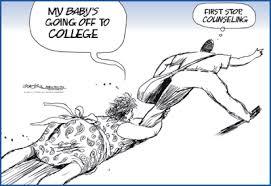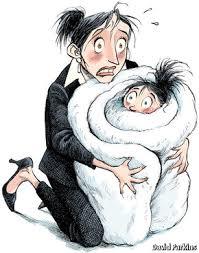Marcia Sirota's Blog, page 33
July 30, 2017
Helicopter Parents Prevent Their Kids From Developing Resilience
Parents who over-protect their kids are obviously trying to do the best for them, but this prevents help these children from becoming resilient and bouncing back from disappointment, loss and adversity.
Recently, I’ve come across a book that addresses resilience in children in a meaningful way. Option B: Facing Adversity, Building Resilience and Finding Joy is by COO of Facebook Sheryl Sandberg, the author of Lean in, and psychologist Adam Grant, author of Originals.
In Option B, Sheryl Sandberg describes the devastating and sudden loss of her beloved husband while they were vacationing in Mexico. She shares that her greatest fear after this experience was that her children would never again be happy, and how she was determined that this would not be the case.
As a result of her loss, Sandberg set out to learn about resilience in order to help her children recover from this loss and eventually, thrive. Sandberg and Grant share what they learned in Option B.
Sandberg writes that no matter what the circumstances of a child’s life, they can become resilient if they grow up with what she describes as “four core beliefs: (1) they have some control over their lives; (2) they can learn from failure; (3) they matter as human beings; (4) they have real strengths to rely on and share.”
Sandberg points to studies which have demonstrated that whether kids grow up in positive environments or in “environments with severe poverty, alcohol abuse or mental illness,” the ones who become “competent, confident, and caring young adults” are those who are resilient.
Sandberg goes on to say that these resilient kids “realize that they have the power to shape their own lives. Their caregivers communicate clear and consistent expectations, giving them structure and predictability, which increases their sense of control.”
Obviously, over-protected kids who have few expectations will fail to develop this first belief so necessary for building resilience.
Sandberg references Carol Dweck, psychologist and author of the book, Mindset, The New Psychology of Success, when she says that “the second belief that shapes children’s resilience is that they can learn from failure.” She writes that “Dweck has shown that children respond better to adversity when they have a growth mindset instead of a fixed one.”
According to Dweck, “A fixed mindset means viewing abilities as something we’re either born with or not.” With a growth mindset, kids “see abilities as skills that can be learned and developed. They can work to improve.”
Sandberg explains that parents and teachers are responsible for which mindset the growing child adopts, and it “depends in part on the type of praise” they give the child.
Studies by Dweck’s team found that “kids who were praised for being smart (based on their performance on a first test) did worse on later tests because they viewed their intelligence as a fixed attribute,” and when these kids “struggled, they decided that they just didn’t have the ability. Instead of attempting to complete a more difficult test, they gave up.”
She adds that “when kids were praised for trying, they worked harder on the challenging test and made more of an effort to finish it.”
Sandberg states that resilience is built when parents and teachers instill a growth mindset into kids. She quotes Julie Lythcott-Haims’ book, How to Raise an Adult, who “advises parents to teach their children that difficulties are how we grow.”
Sandberg says that when parents treat failure as an opportunity to learn rather than an embarrassment to be avoided, kids are more likely to take on challenges” and therefore succeed in life.
Unfortunately, when kids are rewarded for just showing up, when they’re told that they’re fantastic, regardless of what they have or haven’t done, and when they’re so over-protected that they’re never allowed to experience any type of failure, they miss out on developing the second belief essential for building resilience.
Sandberg describes the third belief that helps to build a child’s resilience as “mattering: knowing that other people notice you, care about you and rely on you.” She says that this comes when parents “listen closely to their children, show that they value their ideas, and help them create strong, secure attachments with others.”
Sandberg writes that “in a study of more than two thousand adolescents between the ages of eleven and eighteen, many of whom faced severe adversity, those who felt they mattered were less likely to have low self-esteem, depression, and suicidal thoughts.”
Sandberg says that it doesn’t take much to show a child that he or she matters. It comes from spending a bit of time with them, acknowledging their feelings, helping them to reach out to other kids and build friendships, and teaching them empathy.
In this regard, spoiling kids backfires. Coddled kids grow up feeling overly-important, overly-entitled, and they lack social skills, emotional intelligence and empathy. As a result, they fail to develop this third belief necessary for resilience.
Sandberg describes the fourth belief that is held by resilient kids, which is “that they have strengths they can rely on and share with others.” She mentions a program in India called Girls First that “teaches girls to identify and practice different strengths of character – from courage to creativity, justice to kindness, humility to gratitude.” Sandberg shares that after only six months of one hour per week sessions, girls “saw their emotional resilience climb.”
Sadly, when parents do too much for children and teachers progress them through school without the expectation that they complete the curriculum, these children fail to identify their own strengths. In fact, they grow up feeling insecure, inadequate and incompetent.
Sandberg sums up the four beliefs that go to building resilience in this way: “With the right support, beliefs can fuel action and become self-fulfilling. Believe you can learn from failure and you become less defensive and more open. Believe you matter and you spend more time helping others, which helps you matter even more. Believe you have strengths and you start seeing opportunities to use them.”
Sandberg says that “the beliefs that help build resilience become even more critical” when “kids face trauma.” Whether this trauma is a chaotic upbringing, a tragic loss such as the one Sandberg’s family experienced or any other adverse event, it’s obvious that these four beliefs will make the difference between a young person who barely survives and one who thrives.
It’s clear from the above that over-protecting kids and having too few expectations of them will prevent kids from building resilience, and lead to young adults who struggle in life rather than thrive.
Sign up here for my monthly wellness newsletter. September is all about creating success at school.
Listen here to my latest podcast. Former award-winning gamer Nicholas Cole discusses the writer’s life today.
Take my short survey on Helicopter Parenting here and be eligible to win an ebook of Be Kind, Not Nice, the latest book in my Short and Sweet Guides to Life series.
July 25, 2017
Helicopter Parents Need to Let Teachers Do Their Jobs
Lately, I’ve been writing a lot about the epidemic of bubble-wrapped and over-protected children. What I’ve been saying is that when parents do too much for their children and deprive them of any consequences for their bad behaviour, these children grow up lacking the skills and attitudes necessary for success in all aspects of life.
Sadly, it’s not only parents who have this well-intentioned but utterly wrong-headed approach to bringing up kids. Schools are also adopting a bizarrely lenient attitude toward disciplining children as well as bending over backwards to accommodate these children’s and their parents’ every demand. This is evident at all levels of education, from primary school to colleges and universities.
I was speaking to someone recently who is knowledgeable about the school policies at the elementary level in Ontario. What I learned from this person horrified me, because it described a school environment in which children are subject to virtually no discipline and are graduated to the next grade regardless of whether or not they have learned the material.
In our discussion it became clear to me that many of the young people in these schools will finish their elementary education lacking the fundamental academic and social skills required to succeed in higher education or in the workplace.
According to my source (whose information has been corroborated by others) in grade schools in Ontario, teachers are no longer allowed to defend themselves if students physically assault them. They are expected to stand there and take it.
Also, because these students are under no expectation of appropriate behaviour and are receiving no discipline or consequences for misbehaving, incidents of student-on-student and especially student-on-teacher violence are escalating at an alarming rate.
The answer to this from school administrations: teachers are told to wear body armour to class. In fact, teachers are subject to reprimands or worse if they call out a student for attacking them and often, the teachers are blamed for the attacks, even when they’ve been ganged up on by a group of aggressive teens.
Recently I read an article about how gangs of teen-agers are attacking people and their pets at a local dog park. It’s not surprising that they’d be doing this, if such wilding behaviour is condoned and even encouraged in the schools.
The rate of PTSD in many grade school teachers is currently on par with that of police officers, and if things continue apace, there will be no-one willing to go into teaching at all. The saddest thing is that these schools are turning out children who are more suited to a criminal lifestyle than to being constructive, productive members of civilized society.
It’s unclear what’s causing these school administrations to believe that children should be subject to no limits, no discipline and no requirements for receiving a passing grade. Perhaps it’s an extreme over-reaction against the excessively harsh discipline employed in the past.
Perhaps these administrators are simply responding to the increasing pressure of those helicopter parents who insist that their children should be allowed to do whatever they want and to graduate, regardless of whether or not they’ve mastered the material.
Whatever the cause, these administrations are, in fact, doing a terrible disservice to today’s young people and to society as a whole.
Childhood is a phase of intense physical, emotional and psychological development. Children need to learn what behaviour is appropriate in their society and how to get along with their peers and the adults in their lives. They need to learn how to play by the rules, as opposed to being taught that it’s acceptable to break the rules or to have no rules at all.
Kids need to learn essential values such as empathy, compassion, responsibility, hard work, self-discipline and dedication. They must develop conscientiousness, resilience and integrity. The way our schools have been doing things, we’ll have exactly the opposite result.
Schools that refuse to set limits, give kids consequences or have appropriate expectations of academic and social performance are depriving their students of the skills and attitudes necessary for their future success and are contributing to the detriment of these young people and to society as a whole.
These types of schools will turn our kids who are at best, incapable of functioning in the workplace or in their relationships and at worst, disturbed individuals lacking any sense of right and wrong or any internal limits to their antisocial acting out.
Our schools don’t have to revert back to institutions in which children are harshly punished for minor infractions, but the pendulum has swung to an absurd degree in the opposite direction.
Children need respect but they also need guidance and limits. They ought not to be abused but at the same time, they ought not to be permitted to abuse others.
They shouldn’t be humiliated for not knowing the lesson, but there ought to be clear and consistent expectations that they behave appropriately and meet a certain standard in order to progress to the next educational or career level.
How will our society function if we continue to graduate illiterate, innumerate young people who have no sense of a work ethic and virtually no social skills or moral compass? How will these young people cope in life without these social, ethical and educational necessities?
If we think it makes kids happier to spoil them, the stats contradict this. The rate of depression, anxiety and addiction in high-school and university students has sky-rocketed in the past few years, and many are saying that over-protective parenting and overly-lenient school environments are a large part of what’s to blame for this.
In many institutions of higher learning, parents of students in their late teens to late twenties are arguing with teachers about their kids’ marks and insisting that the young people receive their degrees, even without having submitted passing essays or exams.
These intrusive parents are going as far as suing these institutions to make sure that their child obtains a degree, even when this young person is unable to perform the skills required for their chosen field. No-one wins in such scenarios; neither the student nor society.
Imagine what would happen if we had to start seeing physiotherapists who had no real knowledge of anatomy or physiology; if engineers began performing their duties without knowing the fundamentals of their profession, or if bridge-builders had graduated school without having learned the necessary material.
What would happen to us if lawyers started being unable to prepare a defense, if nurses no longer understand how to give the proper doses of medication, or if doctors began leaving their training without knowing how to perform that life-saving surgery?
Even worse, what if these incidents of wilding increase? What if we can no longer leave our houses without risking random attacks by gangs of savage youths? If you think this is a fantasy scenario, think again. It’s already happening today.
We’re heading toward a societal crisis of epic proportions if we don’t recognize the danger of continuing to allow our educational institutions to coddle our kids. We’re on the verge of destabilizing our society as we continue to kill our kids with kindness. The madness has to stop.
All over the world, people see education as the number one way to get ahead in life and to transcend difficult circumstances. For millions of young people around the world, attending school is what will enable them to free themselves from lives of poverty and oppression.
If our school administrations continue along these terribly misguided lines, going to school – at least in Ontario – will do exactly the opposite of what it does for everyone else in the world. It will become the thing that actually destroys our children’s opportunities for future happiness and success.
Parents must take responsibility for correcting this situation. They must first of all, stop over-protecting and coddling their own children. They must see that every time they spoil their child, they further decrease the child’s chances of having a happy and successful life.
Parents must also begin lobbying their school administrations, not to be more lenient with their kids but to be less so. They must insist that their children receive appropriate discipline and consequences for unacceptable behaviour.
They must insist that their children not receive a passing grade unless they have mastered the material. They must do these things in order that their children learn how to be positive, productive, adequately educated and socially successful members of society.
This is the only way we’ll be able to save our children and perhaps, even the future of our society.
Sign up here for my monthly wellness newsletter. October is all about letting go of people-pleasing.
Listen here to my latest podcast. Former award-winning gamer Nicholas Cole discusses the writer’s life today.
Take my short survey on Helicopter Parenting here and be eligible to win an ebook of Be Kind, Not Nice, the latest book in my Short and Sweet Guides to Life series.
The Crisis in Our Schools is Destroying our Kids and Our Society
 Lately, I’ve been writing a lot about the epidemic of bubble-wrapped and over-protected children. The main point I’ve been making is that when parents do too much for their children and deprive them of any consequences for their bad behaviour, the children grow up lacking the skills and attitudes necessary for success in all aspects of their life.
Lately, I’ve been writing a lot about the epidemic of bubble-wrapped and over-protected children. The main point I’ve been making is that when parents do too much for their children and deprive them of any consequences for their bad behaviour, the children grow up lacking the skills and attitudes necessary for success in all aspects of their life.
Sadly, it’s not only parents who’ve adopted this well-intentioned but utterly wrong-headed approach to bringing up kids. Schools are also adopting a bizarrely lenient attitude toward disciplining children as well as bending over backwards to accommodate these children’s and their parents’ every demand. This is evident at all levels of education, from primary school to colleges and universities.
I was speaking to someone recently who is knowledgeable about the school policies at the elementary level in Ontario. What I learned from this person horrified me, because it described a school environment in which children are subject to virtually no discipline and are graduated to the next grade regardless of whether or not they have learned the material.
In our discussion it became clear to me that the young people in these schools will finish their elementary education lacking the academic and social skills required to succeed in higher education or in any type of job or career.
According to my source (which has been corroborated by others) in grade schools in Ontario, teachers are no longer allowed to defend themselves if students physically assault them. They are expected to stand there and take it.
Also, because these students are under no expectation of appropriate behaviour and are receiving no discipline or consequences for misbehaving, incidents of student-on-student and especially student-on-teacher violence are escalating at an alarming rate.
The answer to this from school administrations: teachers are told to wear body armour to class. In fact, teachers are subject to reprimands or worse if they call out a student for attacking them and most often, the teachers are blamed for the attacks, even when they’ve been ganged up on by a group of aggressive teens.
I recently read an article about how gangs of teen-agers are harassing and attacking people and their pets in a local dog park. It’s not surprising that they’d be doing this, if this type of wilding behaviour is condoned and even encouraged in the schools.
The rate of PTSD in grade school teachers is currently equal to that of police officers, and if things continue apace, there will be no-one willing to go into teaching at all. The saddest thing is that these schools are turning out children who are more suited to a criminal lifestyle than to being constructive, productive members of civilized society.
It’s unclear what’s causing these school administrations to believe that children should be subject to no limits, no discipline and no requirements for receiving a passing grade. Perhaps it’s a extreme over-reaction against the excessively harsh discipline used in the past.
Perhaps these administrators are simply responding to the increasing pressure of helicopter parents who insist that their children should be allowed to do whatever they want and be allowed to graduate, regardless of whether or not they’ve mastered the material.
Whatever the cause, these administrations are, in fact, doing a terrible disservice to today’s young people and to society as a whole.
Childhood is a phase of intense physical, emotional and psychological development. Children need to learn what behaviour is appropriate in their society and how to get along with their peers and the adults in their lives. They need to learn how to play by the rules; not that it’s acceptable to break the rules or to have no rules at all.
Kids need to learn essential values such as empathy, compassion, responsibility, hard work, self-discipline and dedication. They must develop conscientiousness, resilience and integrity. The way our schools have been doing things, we’ll have exactly the opposite result.
Schools that refuse to set limits, give kids consequences or have appropriate expectations of academic and social performance are depriving their students of the skills and attitudes necessary for their future success and are contributing to the detriment of these young people and to society as a whole.
These types of schools will turn our kids who are at best, incapable of functioning in the workplace or in normal relationships and who are at worst, anti-social individuals lacking any sense of right and wrong and capable of any number of horrendous behaviours.
Our schools don’t have to revert back to places in which children are beaten for minor infractions, but the pendulum has swung to an absurd degree in the opposite direction. That makes no sense at all.
Children need respect but they also need guidance and limits. They ought not to be abused but at the same time, they ought not to be permitted to abuse others. They shouldn’t be shamed or humiliated for not knowing the lesson, but there should be clear and consistent expectations that they meet a certain standard in order to progress to the next educational or career level.
How will our society function if we continue to graduate illiterate, innumerate young people who have no sense of a work ethic and virtually no social skills or social conscience? How will these young people cope without these social, moral and educational necessities?
If we think it makes kids happier to spoil them, the stats contradict this. The rate of depression, anxiety and addiction in high-school and university-age people has sky-rocketed in the past few years, and many are saying that over-protective parenting and overly-lenient school environments are a large part of what’s to blame for this.
In many institutions of higher learning, parents of students in their late teens to late twenties are arguing with teachers about their kids’ marks and insisting that the young people receive their degrees, even without having submitted passing papers or exams.
These intrusive parents are going as far as suing these institutions to make sure that their child obtains a degree, even when this young person is unable to perform the skills required for their chosen field. No-one wins in such scenarios; neither the student nor our society.
Imagine what would happen if we had to start seeing physiotherapists who had no real knowledge of anatomy or physiology; if engineers began performing their duties without knowing the fundamentals of their profession, or if bridge-builders had graduated school without having learned the necessary material.
What would happen to us if lawyers started being unable to prepare a defense, if nurses no longer understand how to give the proper doses of medication, or if doctors began to leave their training without knowing how to perform that life-saving surgery?
We’re heading toward a societal crisis of epic proportions if we don’t recognize the danger of continuing to allow our educational institutions to coddle our kids. We’re on the verge of destabilizing our society as we continue to kill our kids with kindness. The madness has to stop.
All over the world, people see education as the number one way to get ahead in life and to transcend difficult circumstances. For millions of young people around the world, attending school is what will enable them to free themselves from lives of poverty and oppression.
If our school administrations continue along these terribly misguided lines, going to school – at least in Ontario – will do exactly the opposite of what it does for everyone else in the world. It will become the thing that actually destroys our children’s opportunities for future happiness and success.
Parents must rise up and correct this awful situation. They must, first of all, stop over-protecting and coddling their own children. They must see that every time they spoil their child, they further decrease the child’s chances of having a happy and successful life.
Parents must also begin lobbying their school administrations, not to be more lenient with their kids but to be less so. They must insist that their children receive appropriate discipline and consequences for unacceptable behaviour, so that these children learn how to be positive, productive, socially successful members of society.
This is the only way we’ll be able to save our children and perhaps, even the future of our society.
Sign up here for my monthly wellness newsletter. September is all about how to build resilience.
Listen here to my latest podcast. Delaney Ruston discusses her latest film, Screenagers, and talking tech with our kids.
Take my short survey on Helicopter Parenting here and be eligible to win an ebook of Be Kind, Not Nice, the latest book in my Short and Sweet Guides to Life series.
June 26, 2017
Why Bubble-Wrapped Kids Grow Up Feeling as Overwhelmed as Abused Kids
It seems like a lot of young people today feel helpless and overwhelmed. They’re anxious and stressed and have little confidence in their ability to solve their own problems. In fact, they feel like victims in their lives.
There are two types of childhood experiences that leave young people feeling this way: the experience of childhood abuse and trauma that leaves the young person with a sense of “learned helplessness,” and the experience of being so bubble-wrapped and overly protected that the young person fails to develop a strong sense of autonomy, accountability and confidence.
The experience of trauma leaves lasting scars. The young person’s feelings of helplessness and being overwhelmed can linger for decades.
Abuse and trauma are debilitating, and when a child is hurt by an adult and no other adult comes to protect or rescue him, he’s left with what’s called “learned helplessness,” or the belief that he’ll never be able to escape similar hurts when he’s grown up. As an adult, he’ll feel incapable of fending for himself.
What few of us consider, however, is how debilitating it is to be raised by parents who bubble wrap their child.
It’s terrible to grow up being hurt or abused but it’s just as bad for a child when her parents take over doing the things that the child should be learning how to do for herself, or when the parents protect the child from every possible hurt, loss or disappointment.
While it’s clear that trauma can be extremely damaging, an excess of coddling and overprotecting can have the same result, as the child fails to build the necessary skills and resilience (not to mention character) that will enable her to cope with the inevitable challenges of life.
Victim-mentality is a sense of helplessness in the face of difficulties. It’s a sense of fearfulness, a lack of confidence and the experience of self-doubt. Someone with victim-mentality believes that they can’t cope with life’s stresses and that other people are far better equipped to deal with their problems than they themselves are.
Traumatized young people often grow up feeling this way, but so do many kids who have grown up with helicopter parents. It’s clearly not just the presence of abuse but an excess of parental smothering that prevents a young person from growing up to feel confident and empowered.
The cure for those who’ve been neglected, abused or traumatized is to spend time on healing the emotional wounds incurred from such a childhood and to develop a deep and lasting sense of self-confidence – confidence in their ability to handle whatever life throws them.
In my book, Emotional Overeating, I outline my theory of addiction, recognizing it as a misguided attempt at emotional self-care. In the book, I detail my “four-pronged approach” to emotional healing from a hurtful childhood.
The cure for those disempowered young people who’ve grown up with helicopter parents is similar yet different. They, too, need to build their self-confidence, but for them it’s by taking on challenges, and building a sense of agency and mastery in life.
They must learn to stand on their own two feet. They must build coping strategies and resilience on the face of loss, failure and disappointment.
It’s necessary for these young people to face the things that are uncomfortable, awkward and scary and to see that often, they can succeed if they go for it. And if things don’t work out the way they hoped, they can use these experiences as opportunities to learn valuable life lessons.
Someone with victim-mentality is unable to take responsibility for themselves. They see others as the source of their difficulties and blame others for their problems. More worrisome, they expect other people to solve their problems for them.
Over-protected children aren’t allowed to confront their problems on their own, so they never develop confidence in their own coping skills. These children grow up feeling just as helpless, overwhelmed and without agency as those who were traumatized when young.
Parents today are more aware of the negative impact of trauma on the development of their children. Perhaps that’s why so many of them have allowed the pendulum to swing too far in the opposite direction and have been over-protecting their kids.
Clearly, going to the other extreme doesn’t work. Children need to be encouraged to face challenges, take on responsibilities and accept the consequences of their actions. Parents must help them to think independently, discover their own coping strategies and learn from their mistakes.
This is the type of parenting that build resilience and character and that will prevent a child from feeling like a helpless victim when they grow up.
Sign up here for my monthly wellness newsletter. September is all about making the next year at school your best ever.
Listen here to my latest podcast. Delaney Ruston discusses her latest film, Screenagers, and talking tech with our kids.
Take my short survey on Helicopter Parenting here and be eligible to win an ebook of “Be Kind, Not Nice,” my latest book.
Conquering the Epidemic of Victim-Mentality
It seems like a lot of people today feel helpless and overwhelmed. They’re anxious and stressed and have little confidence in their ability to solve their own problems. In fact, they feel like victims in their lives.
There are two types of people who feel this way: those who experienced terrible hardships as young people and those who were so spoiled and overly protected that they’ve failed to develop a strong sense of autonomy and confidence.
The experience of trauma leaves lasting scars. The feelings of helplessness and being overwhelmed can linger for decades, and when children are hurt and not protected or rescued, it leaves them with what’s called “learned helplessness,” or the belief that they’re unable to fend for themselves.
What few of us consider, however, is how debilitating it is to be raised by parents who bubble wrap their child, doing things for their child that the child should be learning how to do for themselves, and protecting their child from every possible hurt, loss or disappointment.
While it’s clear that an excess of trauma can be extremely damaging, an excess of coddling and overprotecting can have the same result, as the child fails to build up the necessary skills and resilience (not to mention character) which enable them to cope with the challenges of life.
Victim-mentality is a sense of helplessness in the face of difficulties or challenges. It’s a fearfulness, a lack of confidence and a sense of self-doubt.
Traumatized young people often experience this, but so do many kids who grow up with helicopter parents. It’s clearly not just a lack of love and nurturing but an excess of parental involvement that can prevent a young person from growing up to feel confident and empowered.
The cure for those who’ve been neglected, abused or traumatized is to heal the emotional wounds from such a childhood and to develop self-love and self-confidence.
My book, Emotional Overeating, outlines my theory of addiction as a misguided attempt at emotional self-care and details my “four-pronged approach” to emotional healing from a hurtful childhood.
The cure for those young people who’ve grown up with helicopter parents is to build self-confidence by taking on challenges, not by avoiding them.
It’s necessary for these young people to face the things that are uncomfortable, awkward and scary and to see that often, they can succeed if they go for it. And if not, they can learn from their mistakes.
A victim feels that they aren’t up to any challenge. Everything seems too overwhelming to them. This happens if they had to face overwhelmingly painful experiences as a child or if they were so overprotected that they grew up to see even the littlest challenge as “too much” to deal with.
Parents today are more and more aware of the negative impact of trauma on the development of their children. Perhaps that’s why so many of them are swinging the pendulum in the far opposite direction and overprotecting their kids.
Clearly, neither extreme works. Children need a combination of love and limits. They need to be encouraged to face challenges, take on responsibilities and accept the consequences of their actions.They need to be enabled to stand on their own two feet, make their own decisions and learn from their mistakes.
All these things build resilience and character and will prevent a child from feeling like a helpless victim as an adult.
Sign up here for my free monthly wellness newsletter. August is all about making the next year at school your best ever.
Listen here to my latest podcast. Nicholas Lovell, author of The Curve, talks about making money in the free economy.
Why Do So Many Young People Feel Powerless in Their Lives?
The things that happen to us in childhood are responsible for many if not most of the attitudes, beliefs and expectations that we carry into our adult lives.
If we received adequate nurturing, validation and protection from our parents (and the other important adults) in our childhood, we’re more likely to grow up feeling confident, competent and empowered as adults.
If, on the other hand, we were given inadequate nurturing, validation or protection, or if we’ve been hurt, neglected or abused, we’re much more likely to grow up full of self-doubt, self-criticism, anxiety and depression, even addictions.
Children who know that they were loved, protected and validated are a lot more likely to grow up feeling like they can meet the challenges of life head-on.
They feel capable of coping with whatever life throws them and they rarely, if ever, feel overwhelmed.
Children who were constantly criticized, rejected, neglected or abused by the important adults in their lives become adults with low self-esteem and poor coping strategies.
Because of all the negativity thrown at them at an early age, they don’t feel empowered and they don’t have a lot of faith in their ability to handle the challenges life throws at them.
Interestingly, children who were over-protected and who never were allowed to practice their skills of coping with difficulties are going to grow up feeling just as overwhelmed and helpless as the group that was neglected or abused.
Parenting is a bit like the Goldilocks and the Three Bears fairy tale. Parents need to be not too cold – insensitive and hurtful, or too hot – overprotective and prone to doing too much for the child.
Parents need to be “just right,” which is to be loving without coddling and supportive without being overly controlling. “Just right” parents raise kids who feel empowered and confident in their adult lives.
Ideally, parents show their children love by setting a good example, being teachers and guides, setting clear limits and having high but not unreasonable expectations of their children.
What “just right” parents don’t do is allow their children to do whatever they want without consequences. They don’t let their children get away with any sort of bad behaviour and they don’t protect their children from the consequences of their actions.
These “just right” parents teach their children the value of hard work, sacrifice, and sustained effort over time. They teach their children to think and act for themselves and to become autonomous, self-directed adults who don’t shy away from a challenge.
Overly-protective (helicopter) parents want the best for their kids but by doing too much for them and sparing them any consequences of their mistakes, never enable their kids to develop resilience in the face of disappointment or adversity.
These kids don’t develop what psychologist and author Angela Duckworth calls, “grit,” or a “tendency to sustain interest in and effort toward very long-term goals.”
Parents who make everything too easy for their kids and never let them fall down and see that they can get up on their own are doing their kids a real disservice, as these kids are too soft and too easily overwhelmed by life’s difficulties and challenges.
It used to be that the children who struggled with abusive, neglectful or chaotic upbringings were the ones who felt the most overwhelmed and helpless as adults, but today, this group is almost being surpassed by the over-protected, overly spoiled kids raised by helicopter parents.
In an excellent 2012 New York Times article, entitled Raising Successful Children, psychotherapist Madeline Levine says that “hanging back and allowing children to make mistakes is one of the greatest challenges of parenting.”
Dr. Levine goes on to say that “to rush in too quickly, to shield (your children), to deprive them of … challenges is to deprive them of the tools they will need to handle the inevitable, difficult, challenging and sometimes devastating demands of life.”
In my recent article about the pitfalls of helicopter parenting, I describe how over-parenting is making it harder and harder for young people to cope in the workplace and how they face staggering rates of anxiety and depression.
The good intentions of helicopter parents are backfiring, creating overwhelmed young adults who can’t cope with the slightest challenge in their relationships or their careers.
The reason so many young people today are feeling helpless and overwhelmed is that their parents are crippling them with over-protection and over-involvement in their every activity.
As Dr. Levine stated in her article, “the happiest, most successful children have parents who do not do for them what they are capable of doing.” She adds that, “continued, unnecessary intervention makes your child feel bad about himself.”
If we want fewer young people walking around these days feeling overwhelmed and helpless, it’s not enough to address the serious problems of child neglect and abuse.
We also need to make sure that helicopter parents begin to back off and allow their children to learn from their mistakes, try challenging things on their own (even if they might fail), and face the consequences of their various actions.
Only then will these young people develop the resilience and grit that will enable them to tackle life’s toughest challenges with a confident attitude and a sense of real empowerment.
Sign up here for my free monthly wellness newsletter. August is all about making the next year at school your best ever.
Listen here to my latest podcast. Nicholas Lovell, author of The Curve, talks about making money in the free economy.
June 15, 2017
Parents, Don’t Raise the Next Generation of Incompetent Kids
I’ve been writing a lot lately about the consequences of helicopter parenting on young people currently graduating from college and university. I hope I’ve made my point that over-protecting and coddling our kids is not doing these young people any favours.
Many of the radio hosts who’ve interviewed me recently have been asking, “What can parents do now, if they have young children, to protect them from the consequences of helicopter parenting?”
They want to know how parents of younger children can prevent them from experiencing the types of employment struggles that over-indulged, bubble-wrapped kids inevitably face.
Here’s the answer: ruthless compassion parenting.
I started my Ruthless Compassion Institute in 2009 to teach people how to “be kind, not nice.” What this means is to stop trying to please other people and start being more honest and clear about what we feel, what we need, and what we’ll accept (or not) from them.
We can practice ruthless compassion with our children by loving them and guiding them without over-indulging or over-protecting them.
Many parents these days are trying too hard to please their kids, as opposed to teaching, inspiring and setting an example for them.
It’s very important to nurture and protect our kids, but these days, children are spoiled and over-protected. They’re given a passing grade when they haven’t done the work to deserve it, and they’re rewarded just for showing up.
Sadly, all of the above leads to overly entitled, insecure young adults who struggle to cope with their adult responsibilities.
Parents and educators these days are obsessed with kids’ self-esteem. As a psychiatrist who practices psychotherapy every day, I can tell you for a fact that empty praise and empty rewards do absolutely nothing to build up a child’s self-esteem.
Children are smart. When we give them a passing grade even though they haven’t done the work, or we reward them just for showing up, they know that the grade and the reward aren’t meaningful, and these things don’t make them feel any better about themselves.
Kids will develop self-worth by engaging in meaningful activities and positive relationships where they learn and grow and yes, even occasionally fail.
When kids work hard at a goal or put in effort to build skills and relationships, they’ll feel better and better about themselves, regardless of what awards they receive.
Building self-esteem has nothing whatsoever to do with protecting children from the consequences of their actions. When we deprive kids of these consequences, they fail to learn important life lessons about cause and effect and they miss an opportunity to build character.
Learning, especially from our mistakes and our failures, is what will build a child’s self-esteem and develop a good character. We need to stop protecting our kids so much that they never have a chance to figure out how to course-correct and do better next time.
Self-esteem is built by trying, falling down, learning and problem-solving. It’s built by putting in the effort, the hours, the sweat and the tears. It’s not built by having things handed to us on a silver platter.
Character is built by learning to tolerate disappointment, loss and failure. It’s built by being able to see ourselves clearly and have a sense of humour and perspective about our shortcomings.
Giving kids a trophy just for playing the game makes them think that they should be rewarded simply for showing up. This won’t work out so well for them if they simply show up at their first job.
Helicopter parenting (or teaching, or coaching) prevents a child from learning the kind of positive work ethic that will lead them to career success.
In fact, it’s a set up for failure, unless the young person quickly figures out that they’re actually expected to do some work at their new job.
Helicopter parenting comes from love, but it’s a misguided approach that cripples children and leaves them ill-prepared for the challenges of adult life.
Ruthless compassion parenting, on the other hand, teaches children that they have to be responsible for themselves and for their actions. It helps them develop meaningful skills and good work/study habits.
Ruthless compassion parenting helps kids grow up to be humble, respectful, polite and reliable. It helps them to become conscientious and hard-working. It teaches kids to stick with tough challenges, and keep going until they find a solution.
Kids with helicopter parents are encouraged to give up (or at least, are not encouraged to persevere) when things are tough, and therefore they fail to build the confidence, self-worth, skills and mastery that come from persevering.
Ruthless compassion parenting helps kids become independent, autonomous and self-directed. They learn to stand on their own two feet and think for themselves, which are things that helicopter-parented kids can’t do.
When parents go overboard in trying to protect their kids from any discomfort or shelter them from any disappointment, they raise weak children who can’t cope with even the most basic challenges.
These young people enter the workplace and are immediately overwhelmed by the real demands and responsibilities of adult life.
On the other hand, children raised with ruthless compassion are strong and resilient. They’ve faced challenges and they’ve coped with failure, loss and disappointment. They’ve learned to figure things out on their own and they’re confident in their abilities to solve their own problems.
With their parents’ love, encouragement, guidance and support (but not excessive protection) they’ve developed confidence, competence, autonomy and self-esteem.
If you’re a parent who doesn’t want to raise the next generation of insecure, overwhelmed and incompetent young people, please give up your habit of helicopter parenting and start to practice ruthless compassion parenting.
It’s not too late to switch gears. You can teach your children the kinds of values, attitudes and habits that will build genuine confidence and self-esteem and will enable them to be successful in their future careers.
Sign up here for my free monthly wellness newsletter. July is all about giving up the victim mentality and embracing your inner warrior.
Listen here to my latest podcast. Nicholas Lovell, author of The Curve, talks about making money in the free economy.
June 4, 2017
Making a More Meaningful Summer for Your Kids
As I get older, time goes by so much faster. If I’m not making the most of my time, I figure I’m probably wasting it.
Summer is a perfect example of this. The season here in Canada is so short that if we blink, it’s over. If I don’t take a moment to think about how I’m going to spend it, it becomes a wasted opportunity.
For parents, this is even more important. Kids are so busy during the school year that there’s little time to stop, take stock and think about things other than education and extracurricular activities.
During the summer, parents can stretch a bit and consider involving their kids in character-building activities that will benefit the young people for years to come.
Parents could resort to the same types of activities they’ve depended on, up until now, or they could choose to involve their kids in activities and projects that are perhaps more meaningful and enriching.
Kids can wind up the summer with a great tan and some souvenir T-shirts, or they can come away with amazing new skills, increased self-knowledge and confidence, new and lasting connections and a sense of greater purpose.
In this era of helicopter parenting that finds kids over-indulged with so very little expected of them, parents can consciously decide to do something different.
We can set up our kids for success by putting them into situations that challenge them, inspire them and bring out the best in them.
Summer is short and the opportunity is fleeting. If you’re a parent, it’s not to late to shift gears and start working on creating a more meaningful experience of summer for your kids, right now.
Sign up here for my free monthly wellness newsletter. July is all about giving up the victim mentality and embracing your inner warrior.
Listen here to my latest podcast. Nicholas Lovell, author of The Curve, talks about making money in the free economy.
June 3, 2017
The Most Important Thing Commencement Speakers Aren’t Telling New Grads
For those of you in your last semester of college or university, it’s spring and you probably feel like celebrating. You’ve spent the past few years working hard (or maybe not that hard) and you’re looking forward to a break from classes, papers and exams.
Perhaps you’re planning a summer vacation. Or maybe, you’re doing some serious thinking about your future and your next steps toward a brilliant career.
Graduation ceremonies will soon be taking place all across Canada and the US. Young people will be donning their caps and gowns and receiving their diplomas. Commencement addresses will be made.
Sadly, many of the people who’ll be giving these addresses won’t be telling you the most important thing you need to hear.
Yes, they’ll congratulate you on your accomplishments. Maybe they’ll even mention how things are tough out there and how you’ll need to be prepared for a significantly more competitive marketplace.
The most important thing they aren’t telling you is that your attitudes, expectations and habits are to a great extent what will make you or break you in your future working life.
And frighteningly, the people giving these commencement addresses aren’t letting you in on the difficulties you’ll face if you’ve developed counterproductive attitudes, expectations and habits from having been raised by helicopter parents.
What most (if not all) of these speech-givers aren’t saying is that if you’ve grown up with parents who overprotected you, did too much for you, and made you feel like everything was coming to you, you’re going to be at an even greater disadvantage than the average graduate in today’s marketplace.
Helicopter parents make it much too easy for their college-age kids. They load up their cafeteria card so the kid never has to cook; they send their kid care packages of food and clothing so that the kid never has to worry about these things. What this does is prevent the kid from learning how to stand on their own two feet as an adult.
Helicopter parents shield their kids from difficulties, often intervening when their kid gets a bad mark or fails a class. What this does is teach the young person that they never have to be accountable for themselves and never have to face the consequences of their actions.
These helicopter parents love their kids but they’re doing them a terrible disservice, as their kids are coming out of college and university lacking the basic skills and mindset that will set them up for success.
The current research shows that Millenials earn less than their parents did. A 2013 article by J. Maureen Henderson, in Forbes Magazine says that, according to the Progressive Policy Institute, annual “earnings for college grads have declined by $10K since 2000.”
Ms. Henderson writes about how, “according to the American Psychological Association, millennials are the most stressed generation, with a sobering 52% claiming that anxiety was causing them sleepless nights.”
In a May 2017 article about helicopter parenting that I wrote for Huffington Post, I quote a study by the Journal of Child and Family Studies, which found that “college students who experienced helicopter parenting reported higher levels of depression.”
In her article, Ms. Henderson quotes a study from the University of Waterloo’s Professor Markus Moos, who found that “a young person ‘with the same degree, the same job and the same demographic profile is earning less today than they were in the 1980s’ and that reality applies to both white-collar office jobs and those in the service industry. ”
Ms. Henderson also quotes Professor Moos as saying that young people “have to realize, given the findings in the study” “that they’re actually going to have a slightly lower standard of living than their parents.
A January 2017 article in USA Today stated that “millenials earn 20 percent less than boomers did at the same stage of life, despite being better educated.”
Worse yet, the article states that although “education does help boost incomes,” “the median college-educated millennial with student debt is only earning slightly more than a baby boomer without a degree did in 1989.”
It’s clear that these are challenging times for young grads, but the situation is made worse when these grads have parents who’ve been hovering around them, doing too much for them and over-protecting them for their entire lives.
So, if you’re a new grad, what does this mean for you? It means that you’re going to have to work that much harder and smarter in order to simply equal your parents’ level of financial success.
If you don’t want to be left behind in the dust, you’re going to have to examine the attitudes, expectations and habits you’re bringing to your work life.
If you’re a child of helicopter parents, the future will be even less rosy than it is for your peers, unless you start making some significant changes, right now.
Many young people who were raised by helicopter parents have an attitude of overly-entitlement. They don’t think that they have to be held accountable for their actions and they expect great success with minimal effort.
They think that they can do what they want without having to face any real consequences and they tend to avoid significant challenges and hard work.
If you want to be competitive in the new marketplace, you’ll have to bring your A+ game, which means adopting a humble attitude and recognizing that there won’t be any success without serious effort.
You’ll need to be willing to make sacrifices, take responsibility for your actions, and see that there are consequences to every one of your choices.
If you were unfortunate enough to have been raised with helicopter parents, you’ll have that much more catching up to do if you don’t want to be a statistic of the current trend of downward social mobility.
The psychologist Angela Duckworth speaks about one quality essential for success in her book, Grit: The Power of Passion and Perseverance. In a 2016 interview for Canadian Business by Sissi Wang, Ms Duckworth describes how truly successful people bring four qualities to their work, and these four qualities together make up what she calls “grit.”
The qualities that come together to form “grit” are: a deep interest in what they do; the capacity for “deliberate practice,” or hard work focused on a goal; a sense of purpose in that they find their work meaningful, and the resilience that allows a person to bounce back after disappointment or failure.
Sadly, helicopter parents deprive their kids of the opportunity to develop grit and for that reason, impair their ability to succeed in today’s ever more demanding workplace. If you’ve grown up with these types of parents, you’re going to need to work hard to change the trajectory they’ve put you on.
The way things are today, you can’t afford to be a graduate who isn’t aware of how your attitudes, expectations and habits are going to affect your chances of achieving success in the workplace. You can’t be a grad who’s lacking in grit, and you can’t afford to ignore the impact that helicopter parenting will have on your future work life.
It might not be so pleasant to hear a commencement address that offers you these hard truths, but anyone who stands up at the podium and shares this information with you will be doing you an enormous favour.
The fact is that without this knowledge, your classmates with better attitudes, more realistic expectations and more productive habits are going to pass you by on their way to getting the largest slice of the pie.
On the other hand, armed with this knowledge, you’ll be better prepared for the workforce than the vast majority of current grads, and most especially, those who were raised by helicopter parents.
Sign up here for my free monthly wellness newsletter. July is all about giving up victim-mentality and embracing your inner warrior.
Listen here to my latest podcast. Nicholas Lovell, author of The Curve, talks about making money in the free economy.
The Most Important Thing Commencement Addresses Aren’t Telling New Grads
 For those of you in your last semester of college or university, it’s spring and you probably feel like celebrating. You’ve spent the past few years working hard (or maybe not that hard) and you’re looking forward to a break from classes, papers and exams.
For those of you in your last semester of college or university, it’s spring and you probably feel like celebrating. You’ve spent the past few years working hard (or maybe not that hard) and you’re looking forward to a break from classes, papers and exams.
Perhaps you’re planning a summer vacation. Or maybe, you’re doing some serious thinking about your future and your next steps toward a brilliant career.
Graduation ceremonies will soon be taking place all across Canada and the US. Young people will be donning their caps and gowns and receiving their diplomas. Commencement addresses will be made.
Sadly, many of the people who’ll be giving these addresses won’t be telling you the most important thing you need to hear.
Yes, they’ll congratulate you on your accomplishments. Maybe they’ll even mention how things are tough out there and how you’ll need to be prepared for a significantly more competitive marketplace.
The most important thing they aren’t telling you is that your attitudes, expectations and habits are to a great extent what will make you or break you in your future working life.
And frighteningly, the people giving these commencement addresses aren’t letting you in on the difficulties you’ll face if you’ve developed counterproductive attitudes, expectations and habits from having been raised by helicopter parents.
What most (if not all) of these speech-givers aren’t saying is that if you’ve grown up with parents who overprotected you, did too much for you, and made you feel like everything was coming to you, you’re going to be at an even greater disadvantage than the average graduate in today’s marketplace.
Helicopter parents make it much too easy for their college-age kids. They load up their cafeteria card so the kid never has to cook; they send their kid care packages of food and clothing so that the kid never has to worry about these things. What this does is prevent the kid from learning how to stand on their own two feet as an adult.
Helicopter parents shield their kids from difficulties, often intervening when their kid gets a bad mark or fails a class. What this does is teach the young person that they never have to be accountable for themselves and never have to face the consequences of their actions.
These helicopter parents love their kids but they’re doing them a terrible disservice, as their kids are coming out of college and university lacking the basic skills and mindset that will set them up for success.
The current research shows that Millenials earn less than their parents did. A 2013 article by J. Maureen Henderson, in Forbes Magazine says that, according to the Progressive Policy Institute, annual “earnings for college grads have declined by $10K since 2000.”
Ms. Henderson writes about how, “according to the American Psychological Association, millennials are the most stressed generation, with a sobering 52% claiming that anxiety was causing them sleepless nights.”
In a May 2017 article about helicopter parenting that I wrote for Huffington Post, I quote a study by the Journal of Child and Family Studies, which found that “college students who experienced helicopter parenting reported higher levels of depression.”
In her article, Ms. Henderson quotes a study from the University of Waterloo’s Professor Markus Moos, who found that “a young person ‘with the same degree, the same job and the same demographic profile is earning less today than they were in the 1980s’ and that reality applies to both white-collar office jobs and those in the service industry. ”
Ms. Henderson also quotes Professor Moos as saying that young people “have to realize, given the findings in the study” “that they’re actually going to have a slightly lower standard of living than their parents.
A January 2017 article in USA Today stated that “millenials earn 20 percent less than boomers did at the same stage of life, despite being better educated.”
Worse yet, the article states that although “education does help boost incomes,” “the median college-educated millennial with student debt is only earning slightly more than a baby boomer without a degree did in 1989.”
It’s clear that these are challenging times for young grads, but the situation is made worse when these grads have parents who’ve been hovering around them, doing too much for them and over-protecting them for their entire lives.
So, if you’re a new grad, what does this mean for you? It means that you’re going to have to work that much harder and smarter in order to simply equal your parents’ level of financial success.
If you don’t want to be left behind in the dust, you’re going to have to examine the attitudes, expectations and habits you’re bringing to your work life.
If you’re a child of helicopter parents, the future will be even less rosy than it is for your peers, unless you start making some significant changes, right now.
Many young people who were raised by helicopter parents have an attitude of overly-entitlement. They don’t think that they have to be held accountable for their actions and they expect great success with minimal effort.
They think that they can do what they want without having to face any real consequences and they tend to avoid significant challenges and hard work.
If you want to be competitive in the new marketplace, you’ll have to bring your A+ game, which means adopting a humble attitude and recognizing that there won’t be any success without serious effort.
You’ll need to be willing to make sacrifices, take responsibility for your actions, and see that there are consequences to every one of your choices.
If you were unfortunate enough to have been raised with helicopter parents, you’ll have that much more catching up to do if you don’t want to be a statistic of the current trend of downward social mobility.
The psychologist Angela Duckworth speaks about one quality essential for success in her book, Grit: The Power of Passion and Perseverance. In a 2016 interview for Canadian Business by Sissi Wang, Ms Duckworth describes how truly successful people bring four qualities to their work, and these four qualities together make up what she calls “grit.”
The qualities that come together to form “grit” are: a deep interest in what they do; the capacity for “deliberate practice,” or hard work focused on a goal; a sense of purpose in that they find their work meaningful, and the resilience that allows a person to bounce back after disappointment or failure.
Sadly, helicopter parents deprive their kids of the opportunity to develop grit and for that reason, impair their ability to succeed in today’s ever more demanding workplace. If you’ve grown up with these types of parents, you’re going to need to work hard to change the trajectory they’ve put you on.
When you’re at your graduation ceremony, whatever the commencement speaker is saying, if they’re not talking to you about the pitfalls of helicopter parenting, they’ll be letting you down.
The way things are today, you can’t afford to be a graduate who isn’t aware of how your attitudes, expectations and habits are going to affect your chances of achieving success in the workplace. You can’t be a grad who’s lacking in grit, and you can’t afford to ignore the impact that helicopter parenting will have on your future work life.
It might not be so pleasant to hear a commencement address that offers you these hard truths, but anyone who stands up at the podium and shares this information with you will be doing you an enormous favour.
The fact is that without this knowledge, your classmates with better attitudes, more realistic expectations and more productive habits are going to pass you by on their way to getting the largest slice of the pie.
On the other hand, armed with this knowledge, you’ll be better prepared for the workforce than the vast majority of current grads, and most especially, those who were raised by helicopter parents.
Sign up here for my free monthly wellness newsletter. July is all about giving up victim-mentality and embracing your inner warrior.
Listen here to my latest podcast. Nicholas Lovell, author of The Curve, talks about making money in the free economy.
Marcia Sirota's Blog
- Marcia Sirota's profile
- 1 follower












